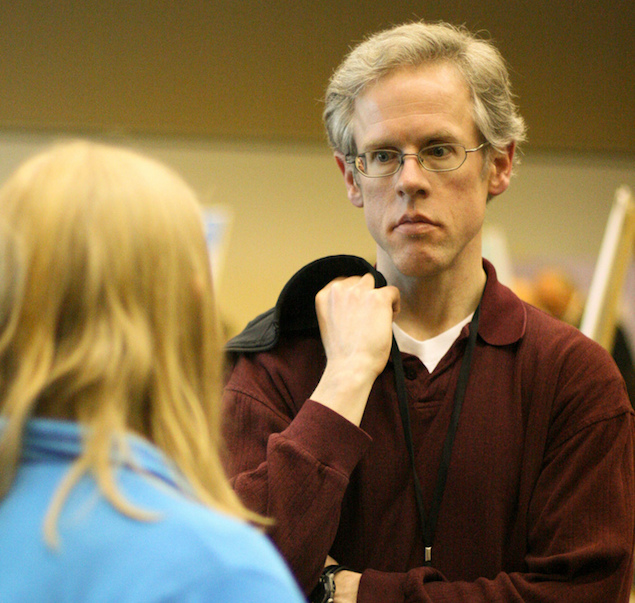Sociability • Social Virtues
How to Be Open-Minded
One of the distinctive features of social life is that most of the people we meet seem really quite normal. They often appear reasonably responsible and logical, harbour little self-hatred or compulsion, and strike us as cheerful and more or less content with their partners and their lives.
This can feel hugely and horribly at odds with what we know of life from our own minds. Beyond a certain age, once we have lived a little inside ourselves, we tend to become acquainted with a range of deeply alarming and regrettable sides to our characters: we recognise the extent of our confusion, compulsion, sexual waywardness, disloyalty, meanness, insecurity and peculiarity.
This gap between the knowledge we have of ourselves and the public evidence of the nature of others can end up feeling intensely bewildering and painful. We may wonder why we may have ended up quite so strange, our lives so difficult, our characters so crooked.
Our sense of isolation is never greater than when we run into the armies, widely distributed through society, of the closed-minded. Full of broadly benevolent intention, these types nevertheless keep a close eye on any signs of the more regrettable aspects of human nature and are ready to censor their appearance from the first. We learn to recognise their disapproval and to keep our shadow sides especially private in their vicinity – which protects our reputations, but increases our underlying sense of freakish isolation.
By contrast, there are those rare individuals who seem able to take most of what we are entirely for granted from the first – and whom we gratefully honour with the term open-minded. Without particular surprise or fuss, they assume from the first that being human is a messy and impure business and that any person they are likely to come across will contain a host of less than ideal dimensions and at points be really quite close to madness. They know, simply on the basis of your membership of the human race, that you have thought and done a range of wild, unethical and sometimes lamentable things. They don’t know the details, but they correctly assume the broad shape of the issue. They calmly accept the gap between how a person appears and what they are probably like in private. For them, a person who seems normal is just someone they don’t yet know very well.
The open-minded are unafraid of what is inside the human soul for two reasons: firstly, because they are confident that there is in almost everyone a huge and secure gap between feelings and actions. They understand that most of what we fantasise about will never be played out in reality and therefore doesn’t pose an active threat to ourselves or the social order. We may well spend a good deal of time entertaining what we’ll say to our enemies, how we’ll give up on everything and everyone (and the world will be sorry), and crafting lurid sexual scenarios contrary to every civilised dictate. But, as the open-minded know, fantasising isn’t a prelude to action, it’s an alternative to it. So our odder thoughts can be looked at, discussed and sometimes laughed over – in the secure knowledge that they will eventually safely be put back in the box. And what’s more, such examination won’t aggravate them, it will help contain and neuter them.
The open-minded also know that the existence of highly troublesome elements doesn’t preclude the simultaneous presence of vast zones of goodness, humility and benevolence in our characters. They are implicitly fond of the distinction, formulated by early Christian thinkers, between ‘the sinner’ and ‘the sin’, and like St Augustine, they strive to ‘love the sinner but hate the sin’. They know that one’s right to charity, attention and friendship should not be irrevocably lost on the basis of our darker sides. While hoping it might be otherwise, the open-minded simply take it for granted that nice people constantly do and think not very nice things.
The open-minded person isn’t merely being sweet in accepting this calmly as a given – and therefore not judging harshly when news of misdeeds arises. They are committed to open-mindedness because they are operating with a picture of how people improve. They implicitly propose that the way we change is through warm forgiveness, not cold censure.
The closed-minded are also committed to improvement, but their philosophy of education involves humiliation and disapproval. Only if a person can be brought to hate themselves enough, they reason, can they be counted upon to start to want to change their ways.
The problem is not only that this fostering of self-contempt can on occasion be very cruel; it is also (more seriously) liable to be extremely ineffective. Self-contempt tends badly to sap the will and renders us hopeless and incapable before its ravages. In the face of it, we may seek refuge in our vices to escape our violent dislike of ourselves and our less admirable characteristics. By the angle of their lips and their moments of silence, the closed-minded act as proactive agents of a counter-productive loneliness. They create a world in which significant parts of ourselves must remain homeless and without a path to redemption.
The open-minded know that most people are already brim-full of self-criticism. We’re not in need of further, harder condemnation. Where we truly need help is in liking ourselves enough to dare to develop, given what we know of the sinister regions of our psyches. By their unshocked reception of the stranger elements of who we are, combined with supportive exhortations to betterment, the open-minded model for us the relationship we would ideally have with ourselves as we strive to encourage the nobler parts of our nature and overcome the weakest. It is easy to see why we should so badly want them as friends.





























